In a comment last week, “Skip” shared a video of some of Bishop Kallistos’ humor. Lest you miss it, I’m copying it here: https://www.youtube.com/watch?v=NR0KZT5rjZc
________________________________________
Introduction
P.S. (“Prescript?”) added the day after publication: Please read the very perceptive and thoughtful Comments at the end of this Post, which mention important things I ignored.
It is the responsibility of the aged (me) to share their wisdom with the young, whether the young want to hear it or not – and here it comes.
First piece of wisdom: Don’t take on a topic which is too much to handle. Like this one.
There were times (most times, apparently) in human history when nothing much changed from one generation to another. This definitely is not one of those times. Does nothing hold still any more?  Now they say 2 + 2 doesn’t always equal 4. (Look it up. I’ll bet you won’t understand it either.)
Now they say 2 + 2 doesn’t always equal 4. (Look it up. I’ll bet you won’t understand it either.)
courtesy of https://brilliant.org/Sabine
Every time I remembered one change, that caused me to remember two more. I couldn’t mention everything.
Actually what follows here will be not wisdom but rather experience. My purpose is simply to give you younger people (which to me is anyone under 70) some long-term perspective. I tried to include no explanations and only a few value judgments. I’ll leave that to you at the end.
I’ll list the changes I’ve seen under two major categories: The World and Religion.
I’ll devote almost all of this Post to changes in the world, since religion tends to be more stable (I think…?), and “God so loved the world”. After all, Jesus spent most of His time out in the world, not in the synagogue.
My purposes:
1 So that you younger people will not be tempted to cling in an unhealthy way to the world as it is now. Many of the things you love in the world are not going to last. Get used to it. Cling to That which will last.
2 So we all can try to consider how as Orthodox Christians we can face up to, cope with, and contribute to the life of this ever-faster-changing world.
Eighty year of memories
Can anyone else here present remember back to 1942? I have scattered memories of World War II: Adults shushing me as they huddled anxiously around the big console radio listening to the news. The beginning of food rationing in 1943. The death of President Roosevelt in April 1945. V-J Day, August 14, 1945, the end of the War: Crowds cheering, cars driving up and down the street with horns honking, church bells ringing, people cheering and waving flags. To this day just thinking about it fills my eyes with tears (like right now).
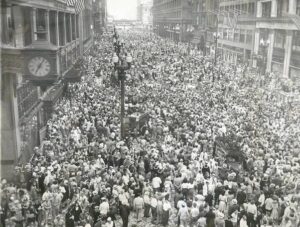
State Street, Chicago (by John Chuckman) – no cars moving here!
After then, all is fair game to talk about. I can’t possibly list everything. If you think I miss anything major, please add a comment below.
I’ll say little about things as they are today. You already know about that.
Let’s get to it.
Changes in The World
1 World Affairs
Eighty years ago, Germany and Japan were our mortal enemies. Communist Soviet Russia and not-yet-Communist China were our allies. Since then Germany and Japan have been among our most trusted allies. Russia and China became our mortal enemies, then for a while not so much, but now I fear they are again.
2 American politics
I intend nothing partisan here, only to convince you younger people not to place too much faith in political parties and politicians:
Only sixty years ago, the Democratic Party still had many prominent racist segregationists, while the Republican Party had many prominent liberals. Sixty years ago a conservative Republican president proposed a national health care program similar to “Obamacare”, and started the Environmental Protection Agency. The Republican nominee for President only ten years ago is now almost unwelcome in the Republican party. That’s how fast politics can change.
Regarding abortion, did you know that only a little over ten years ago Donald Trump was solidly pro-choice, while Joe Biden believed the Roe v. Wade decision legalizing abortion had gone too far. See: https://www.nbcnews.com/meet-the-press/video/trump-in-1999-i-am-very-pro-choice-4802975399
3 Technology and Culture
I remember my mother saying she thought she had experienced the greatest technological change in human history *: from isolation to the ability of people to be in immediate touch with the outside world. Perhaps she was right.
- except maybe for the invention of the wheel
This was before my time, but worth looking at: In the very early Twentieth Century, if you wanted to talk to the neighbors, you walked (or rode) over to see them. If you wanted the news… I remember my Dad telling me that when he was a boy, the only way to keep up with baseball games was to go to the town railroad station, to which place the scores would be sent by telegraph. (Anyone remember the Morse code?) In small towns, the weekly newspaper was better than smoke signals, but (except in the city) by the time it was printed and distributed, the news was already old.
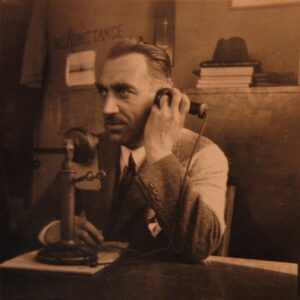 Creative Commons License
Creative Commons License
Then suddenly the telephone: so that people could talk with each other directly. However, there were difficulties: Eighty years ago where I grew up, telephone worked fine, so long as we didn’t mind the neighbors listening in on our “party line”! “Long distance” calls (outside one’s immediate area) were expensive and often undependable.
Therefore till the 1970s the chief source of personal long distance communication remained the hand-written letter (remember those?) with a 3 cent stamp – or the “Penny Postcard”. People often saved letters, which became a cherished record for the family, or even for historians. The other day I rediscovered my Dad’s sweet letters to my Mom when he was out of town on business. This time I really began to cry, and it lasted all afternoon. I felt so close to both of them again, after all these years. My Mom saved all my letters from the time our children were born until the time she died – a treasure. (Today what happens to our emails?)
Next came radio. By the time I came along, we could hear the news, but only at 8 a.m., Noon and 6 p.m., except for the occasional “We interrupt this program for the following news bulletin…” The rest of the radio programs consisted of soap operas, and comedy, adventure and variety shows. There was no such thing as “talk radio” or programs that slanted the news this way or that. Radio at that time had a unifying effect on American society.
As did the movies. People gathered together in movie theaters to see the few shows available, and then everybody talked about them afterwards.
modernica.com
I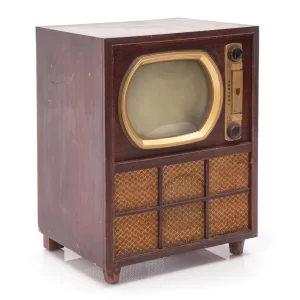 n 1948, I think, Mom, Dad and I saw a crowd gathered at a store window, so we went over to see what was going on. They were looking at this large box with small figures moving on a small black and white screen. It was Television!
n 1948, I think, Mom, Dad and I saw a crowd gathered at a store window, so we went over to see what was going on. They were looking at this large box with small figures moving on a small black and white screen. It was Television!
When we got our first TV, we could receive one channel, then later two. Everybody watched “I Love Lucy” and then next day we all talked and laughed together about it. As late as the 1970s, there there only three national TV networks, which all delivered the same “middle of the road” “nightly news” each evening. That also had a unifying effect on society.
In 1954 a big machine (UNIVAC, which filled the whole side of a room) first predicted the results of a presidential election. It was called a computer – which was almost incredibly less sophisticated than the computer I’m typing on right now or the little one in my pocket.
You younger people, try to imagine a world without (gasp!) the Internet – that means of instant communicating, that vast source of information (without which I could not research or write this Blog), that vast source of misinformation. Internet was supposed to unite society, unite the world, bring us all together, as we shared common information. (How did that ever work out? ) And just for the record (not that I was ever interested, of course…), when I was a teenage boy, “questionable” pictures of this and that and the other were very hard to find. Today all you have to do is go to the computer, push a couple of buttons, and… God help us all.
The automobile. By the time I came along most people had automobiles – though there were still enough horses to keep the blacksmith shop up the street busy. Paved/asphalted main roads were common in many places – though I remember in 1946 my Dad driving our old Pontiac through pouring rain on gravel US-12 through South Dakota. However, in the cities people usually used public transportation (as is still true today in some places). Air travel was still in its infancy, and superhighways were just being invented, so travel over longer distances was usually by bus or by train.
We had some grand trains in those days. (I loved those trains and still do – happily ignoring my own advice not to cling to the past.)
This meant we rode with many kinds of people and often got into conversations with people from places we didn’t know, who had different experiences and ideas from our own. We traveled through towns and villages – not above and around them, we isolated from them and they isolated from us. Most travel helped to unify people, unify the nation.
Just a few more things, quickly:
Styles. When I was young, people usually dressed up when they were going out. Even to shop and certainly to church and for travel, normally women wore dresses, men wore suit and tie. (Note the video above.)
Racism, Sexism. In the early ’40s African-Americans were expected to stay in their place. Example: There was a “Negro” professional baseball league. Until Jackie Robinson came along in 1947 “colored people” (as they were then called) did not play in the Major Leagues. Women almost always stayed home caring for the house and the kids, while men went out to work. There were very very few female doctors or lawyers. In the South black folks rode in the back of the bus and had separate hotels, restrooms and water fountains.
Medicine. Here’s how it was in the early ’40s: no penicillin, no anti-biotics, no ct-scan, no mri – and this list could go on and on. In 1949 my Mother had colon cancer, and it took two major “exploratory surgeries” just to find out what was wrong. She was in the hospital from September 1 till late November and almost died. (However, at the time a “private room” cost $12/day! and most doctors made house calls.)
Until the mid ’60s, almost all men and many women smoked and most houses, restaurants, planes and trains smelled terrible. Cigaret commercials and ads were everywhere. Brace yourself for this one: 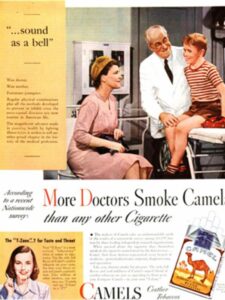
And I haven’t mentioned nuclear weapons and the microwave and the cellphone and…. but I’ve got to stop somewhere.
4 Family/Entertainment/Sexual Matters
They talk about the “sexual revolution”. Yes! Eighty years ago no one would have believed what was coming.
When I was young, people (except for a few notorious movie stars) knew they should live by the old rule: “‘Love’ and marriage go together like a horse and carriage. You can’t have one without the other” – and everybody knew what “love” meant in this case. Why no sex outside marriage? Because what if the girl got pregnant? Then usually boy married girl, whether they even liked each other or not.
Watch the old movies and television, listen to old time radio: Young people, especially young men, could hardly wait to get married, so that… … You were supposed to wait, and believe it or not, you modern young people, it can be done. It usually was done. When a couple lived together outside marriage it was called “living in sin”.
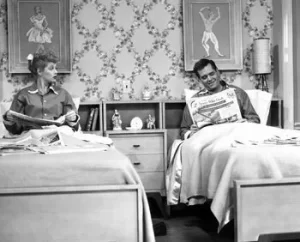 In movies, kissing was allowed, but sexual activity beyond that was only tastefully implied. Even married couples could not be shown in bed together; they almost always had two single beds!
In movies, kissing was allowed, but sexual activity beyond that was only tastefully implied. Even married couples could not be shown in bed together; they almost always had two single beds!
Lucy and Desi
tvtropes.com
By the way, in those days language in the media was always clean. (It wasn’t till 1939 that the word “damn” was allowed in a major movie.) Today we can hear language in the movies and on our living room TV that in those days was considered inappropriate even in the men’s locker room! at least where I lived.
What caused the change? The pill – easy “conception control” – was approved by the FDA in 1960, just as the Baby Boom generation were “inventing” sex, as they seemed to think! Almost overnight family and sexual mores changed. Couples living together, and sex outside marriage became common – and sometimes people forgot or didn’t bother to use birth control. There had always been some illegal abortions hidden behind the scenes, but now there were many more, and they began to become acceptable. In 1973 the Roe v. Wade decision made abortion legal.
In the ’50s, I heard whispered references to homosexuality, but I can’t remember it ever being mentioned publicly. (When she was in her thirties my mother, a professional woman, finally asked my father what it was, and she couldn’t believe it.) If you watch old movies or listen to old songs, keep in mind that at the time “gay” still meant “bright, carefree, happy”. If I recall correctly, I never heard of gay marriage till in the1980s.
Religion
This will be much easier to deal with.
In the 1940s it seemed like everybody went to church, always dressed up.
Mainline Protestantism (Episcopalian, Presbyterian, etc.) was growing rapidly and had considerable national influence.
Roman Catholicism also was growing but was less socially acceptable. As late as 1960 a prominent Methodist pastor wrote an article, published in a major Chicago newspaper: “Why I could never vote for a Catholic for president.” Worship was entirely in Latin. Nuns in full habit were a common sight in many places.
Evangelical Christians were small except in the South. They were not involved in politics, but rather focused on Biblical teaching, personal conversion and quiet worship. We “mainliners” believed they were a dying breed.

billygraham.org
In fact there was an evangelical revival going on. Much emphasis was placed on mass conversions to Christ, a la Billy Graham. Both styles bore little resemblance to much of the modern evangelical movement.
Eastern Orthodoxy: “Who?” (I never heard of Orthodoxy till I went to Methodist seminary in 1960.) Worship was entirely in old country languages. There was almost no English literature. Converts were few and far between.
I think you know what the religious scene is like today, so I won’t describe it..
_______________________________________
After all that, I am winded!
I can’t resist just few value judgments:
In what I wrote above, I suggested several times that our increasing individualism – the decline of community life – is for the worse.
Here, in my opinion, are four (of many) positive developments:
1 Without modern medical technology, I would be debilitated and likely blind by now and probably dead, as would other people whom I love dearly.
 2 Women and people of different races now have prominent places in the media and in sports. Think of all the intelligence and talent that was wasted in the past.
2 Women and people of different races now have prominent places in the media and in sports. Think of all the intelligence and talent that was wasted in the past.
WRAL, Raleigh NC
3 During the Pandemic, email and texting brought me much closer to my family and friends at a distance, and that closeness has continued.
4 Were it not for the changes in Anglicanism and in Orthodoxy, I would not be Orthodox today!
__________________________________
Now it’s your turn.
God created the world and declared it “very good, very beautiful”. Look around you. We are surrounded by so much that is beautiful and good. But ever since Eden there has also been the bad and ugly side of things. So long as anyone can remember the world has been both glorious and horrible. It’s the bad, ugly side that we need to beware of and also minister to, and the good, beautiful things in life that we must seek.
So, some questions for you, regarding the changes of the past eighty years:
Which do you think are most for the good? Which most for the evil?
Are there Orthodox Christian ways to 1 make use of the good developments? 2 guard against and perhaps negate the evils? 3 prepare for what appear to be even more rapid changes that are coming?
And, as I asked before, what significant changes have I mised?
So… Comments, please?
Next Week: “God is good and loves mankind.” Really?
Week after Next: I think we’ll begin a series on The Creed
Fr. Bill, one other enormous change is that lack of basic civility in our society in general. Very few people are polite and considerate any longer, and there is no longer any teaching of basic Civics in our schools. Years ago, when a funeral cortege was driving through any Town, people would stop, show respect to the deceased, and many would take of their hats or even even cross themselves. Between all of the behavioral permissivenss, impersonal communication (ie. the internet), and flood of communicaiton of all kinds – good, bad, true, false – our society has degenrated to being rude and judgmental. Common decency has evaporated. This is part of what we in the Clergy need to preach – Judge not, and Love your neighbor.
Amen! “Manners makyth man”: motto of William of Wykeham (1324-1404), Bishop of Winchester and Chancellor of England
Father Bill:
I would like to offer another area in our culture that has had and continues to have influence on the American people – music. I grew up in the 60’s and I love the “oldies”. I’m sure many of your readers could tell you where they were when they heard a certain song on the radio. I remember the first time I heard the Beatles singing their first hit “I Want To Hold Your Hand”. I was in the back seat of the car on the way to church on a Sunday morning. My older brother made dad turn it up. Needless to say dad was not a big fan. He liked the Big Band music. I really like that music a lot, too. But during the 60’s, every radio station played all the same music, except for the occasional classical musical station. That seemed to unify the country. And to me, most of the music was about love. It was mostly harmless – at least I thought so – and it was fun and positive (until songs protesting Vietnam started to come out.) There were very few songs with “bad language” and negative messages. Today, however, there are many, many genres of music available. Some of the music out there is full of anger and words that would cause a good washing the mouth out with soap in my early days. The sad thing is too many young people listen to those types of music. Music is a powerful medium. I have a hard time finding music that is “peaceful” these days. In my protestant days contemporary Christian music became popular and I enjoyed the music of The Maranatha Singers. Many of their songs were scriptures and many of them were easy listening and of course positive. But to me it appeared that the contemporary music became the focus on Sunday mornings. Since then, much of the contemporary Christian music has began to sound more like the music of the world.
I truly appreciate the music in the Orthodox church. For one thing, it is different from any other genre that you will find on the radio. (However, they used to say on American Bandstand it’s “hard to dance to!”) And secondly, it is a tremendous way learn the faith of the Orthodox church. I don’t foresee an Orthodox band” in the coming days in liturgy, and I have to say I’m fine with that.
Father, you might find profitable the book “The Master and his Emmisary” by Dr. Ian McGilquist (though I must warn people it is LONG at something near 800 pages – even the unabridged audio book clocks in at over 27 hours). Dr. McGilquist makes the case that much of what has come asunder in our manners, our ways of interacting with each other, and indeed our very perceptions of the world, is very like unto a sort of mass societal schizophrenia, where we have reduced practically everything to a sort of objective materialism, where nothing is anymore seen in its proper context, or in relation to anything else. Putting aside for a moment the technological advances of the past decades (though they are bound up in all of this, and aggravate and enhance the disconnection and madness I think many of us sense), at nearly 50 years old I myself, in talking with young men in their late 20s and up to mid 30s, am amazed at the isolation and lack of roots these young men describe. I have long suspected that so much of what has degraded in manners and morality (and in the identitarian madness now amok) is bound up in both the growing physical isolation we now have from one another, and in the consequent loss of ability to properly relate to each other as human beings, not conceptual identities and representations that now take the place of flesh and blood.
To put this in a concrete example – the “othering” of anyone “not of our party”, and the reduction of such people to parodies and avatars of malignant evil, is very much a type of what I worry I see. Put simply, setting aside the technological changes, the biggest change I’ve seen is that we are losing our ability to see other people as people like ourselves. It’s not everywhere, not yet, but it is in many places now.